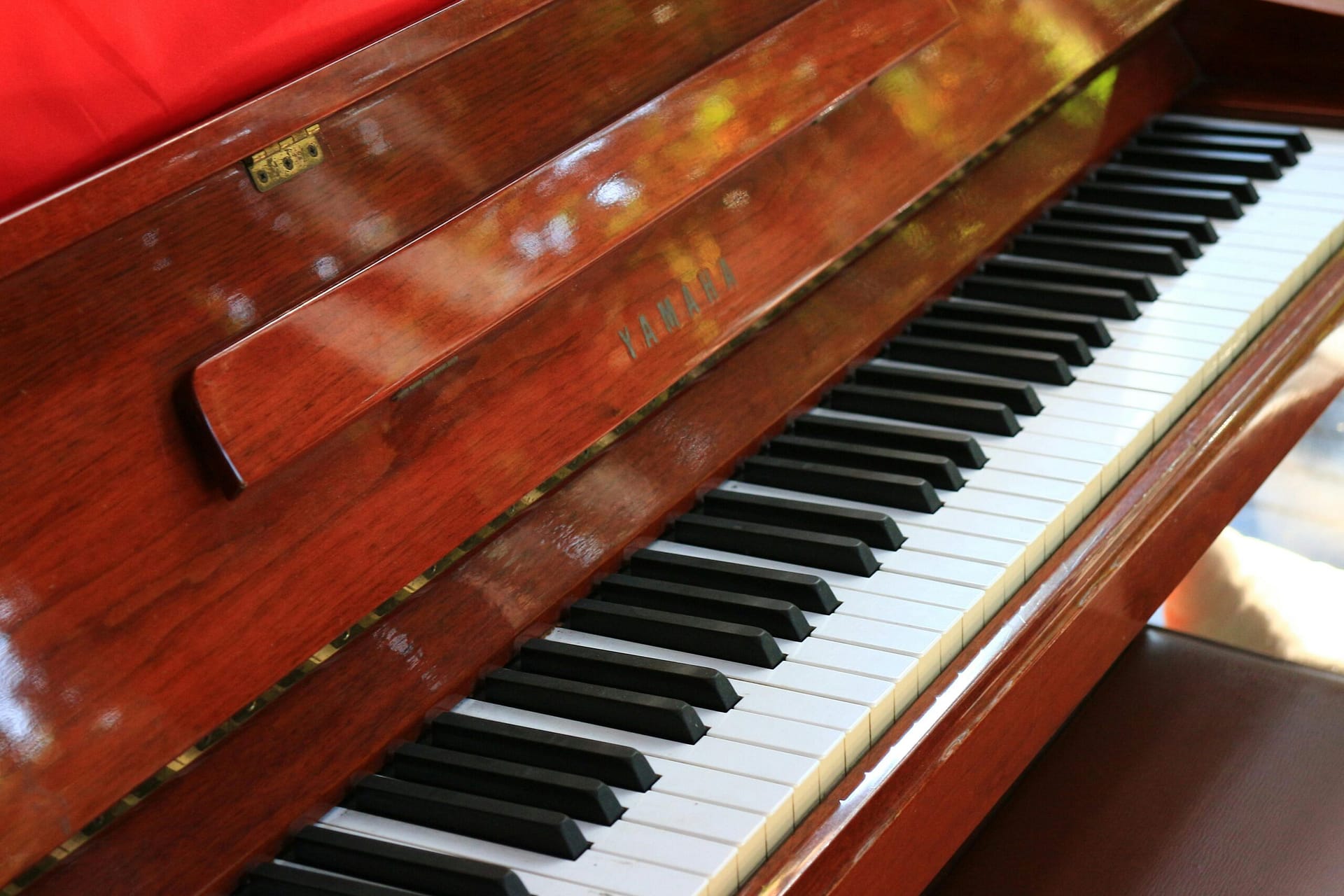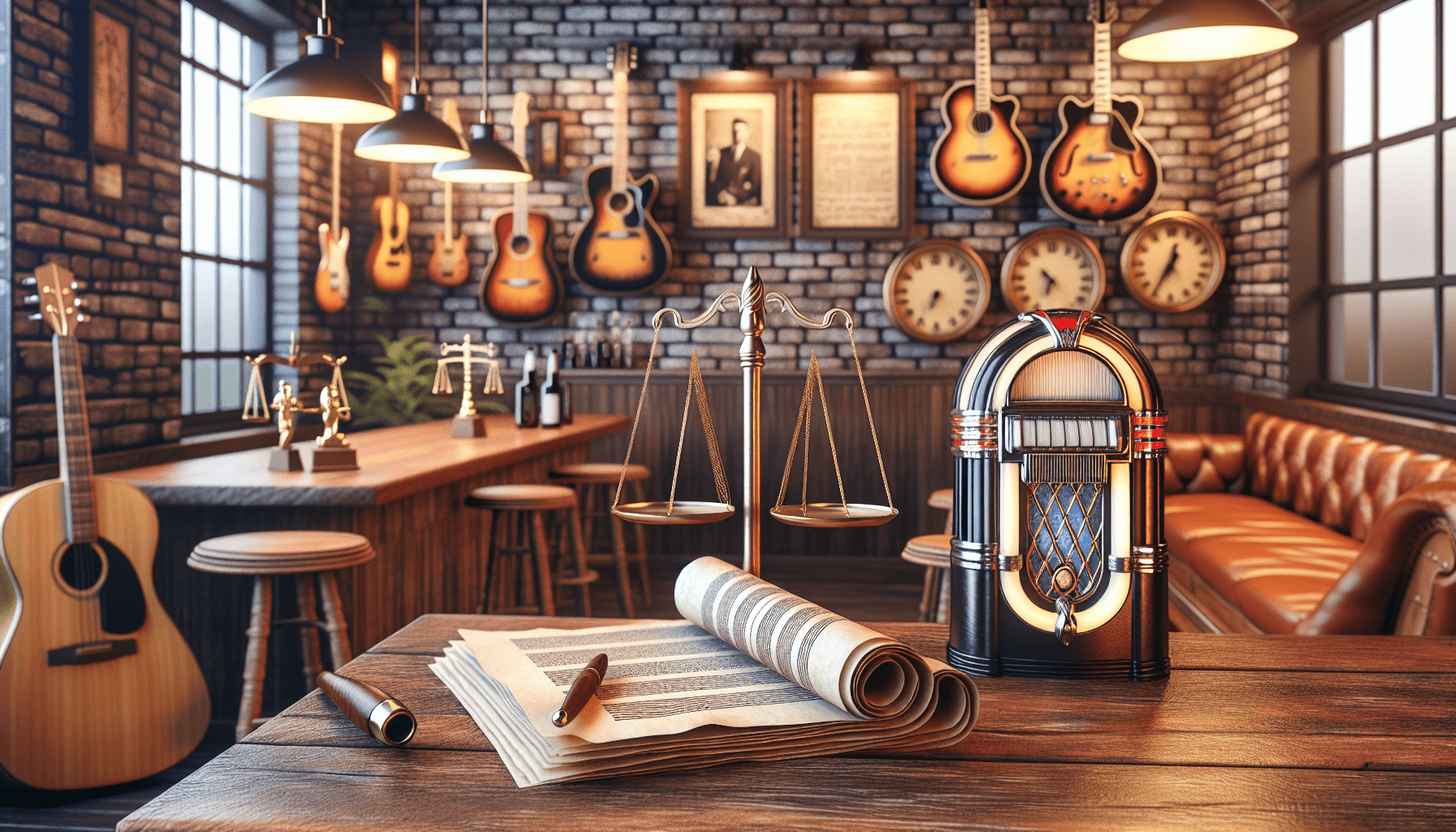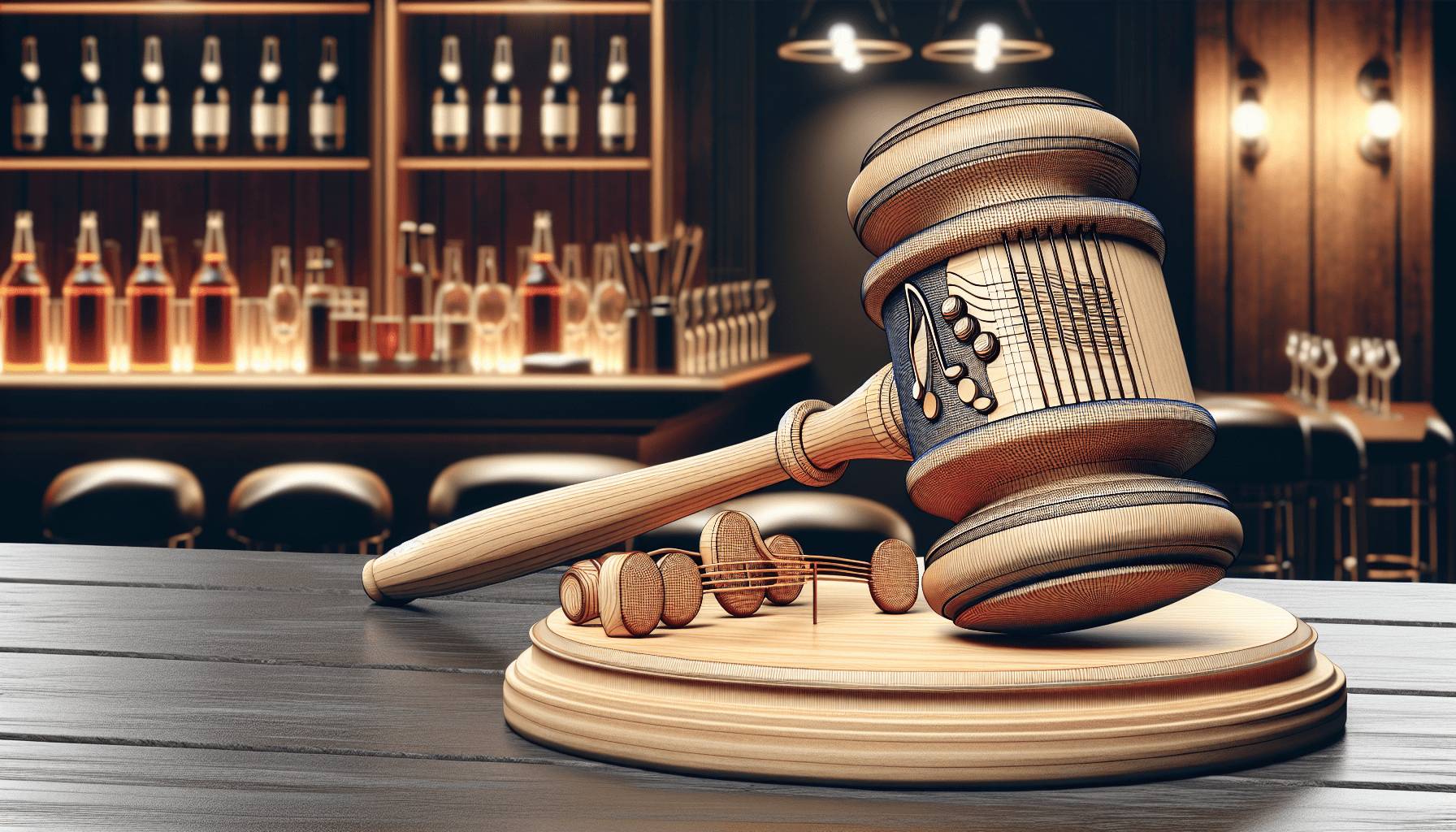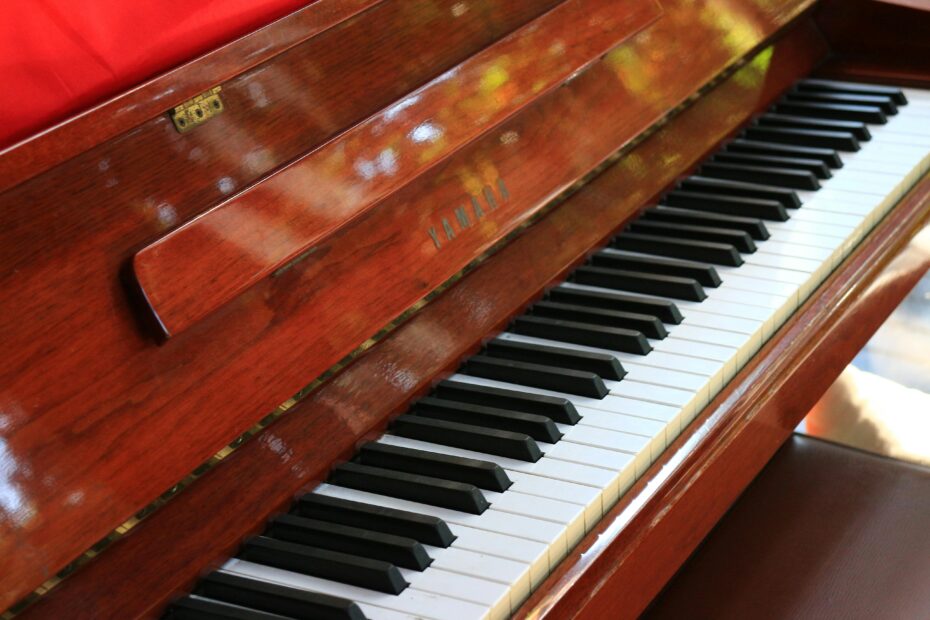Are you a bar owner or manager who loves to create a fun and lively atmosphere for your patrons through the power of music? If so, it’s crucial to understand the legal issues that can arise when it comes to music licensing in your establishment. This article will provide you with essential guidance on how to navigate these potential pitfalls, ensuring that you can continue to provide an enjoyable experience for your customers without facing any legal repercussions. So grab a drink and let’s explore how you can handle music licensing dilemmas effectively and efficiently in your bar.

Understanding Music Licensing
What is music licensing?
Music licensing refers to the process of obtaining permission and legal rights to use copyrighted music. It is a crucial aspect of running a bar that plays music, as it ensures that artists, songwriters, and music publishers receive fair compensation for their work. Music licensing involves obtaining the necessary licenses from various organizations and complying with copyright laws to avoid any legal issues.
Why is music licensing necessary?
Music licensing is essential for a bar to legally play music because it ensures that the creators of the music are compensated for their work. When you play music in your bar, you are using copyrighted material, and obtaining licenses ensures that you have the right to use that music in a public setting. Without proper licensing, you may be infringing on the rights of the copyright holders and could face legal consequences.
Different types of music licenses
There are different types of music licenses that a bar may need to obtain, depending on the specific use of the music. The major licensing categories include:
-
Public Performance Licenses: These licenses are required for playing music in a public setting, such as a bar. They are typically obtained from performing rights organizations (PROs) like ASCAP, BMI, or SESAC.
-
Mechanical Licenses: If you plan to reproduce and distribute recorded music, such as playing CDs or digital downloads in your bar, you will need a mechanical license. Mechanical licenses are obtained from mechanical rights organizations like The Harry Fox Agency (HFA).
-
Sync Licenses: If you want to use music in synchronization with visual content, such as in video advertisements or promotional videos, you will need a sync license. Sync licenses are usually obtained directly from the music publisher or through a sync licensing agency.
-
Master Use Licenses: If you plan to use a specific recording of a song in your bar, you will need a master use license. This license grants you the right to use a particular recording owned by a record label or artist.
Music Licensing Organizations
Performing Rights Organizations (PROs)
Performing Rights Organizations (PROs) are entities that represent the interests of songwriters, composers, and music publishers. PROs collect licensing fees and royalties on behalf of their members when their music is publicly performed, including in bars. Examples of PROs include ASCAP, BMI, and SESAC. Bar owners can obtain public performance licenses from these organizations to ensure they are properly licensed to play music in their establishment.
Mechanical Rights Organizations
Mechanical rights organizations, such as The Harry Fox Agency (HFA), handle the licensing and distribution of mechanical licenses. These licenses are required when a bar wants to reproduce and distribute recorded music, such as through CDs, digital downloads, or jukeboxes. Bar owners can obtain mechanical licenses from organizations like HFA to ensure they are legally allowed to play recorded music on their premises.
Sound Recording Rights Organizations
Sound Recording Rights Organizations represent the rights of record labels and artists. They license the use of specific recordings for public performance. When a bar wants to play a specific recording of a song, they may need to obtain a master use license from these organizations or directly from the rights holders. SoundExchange is an example of a sound recording rights organization that collects and distributes royalties for digital performances.
Obtaining the Necessary Licenses
Researching and identifying the appropriate licenses
To obtain the necessary licenses for playing music in your bar, it is important to research and identify the specific licenses required. Determine if you will be playing live music, recorded music, or music in synchronization with visual content. Different types of licenses, such as public performance, mechanical, sync, or master use licenses, may be necessary depending on your bar’s music usage.
Contacting the relevant licensing organizations
Once you have identified the types of licenses you need, you should contact the relevant licensing organizations. For public performance licenses, reach out to performing rights organizations like ASCAP, BMI, or SESAC. If you plan to reproduce recorded music, contact mechanical rights organizations like The Harry Fox Agency. For specific recordings, reach out to sound recording rights organizations or directly to the rights holders.
Understanding the licensing process
When contacting the licensing organizations, it is essential to understand the licensing process. Different organizations may have slightly different procedures, requirements, and fees. Familiarize yourself with their licensing agreements, application processes, and any additional documentation they may require.
Applying for licenses
After understanding the licensing process, you can proceed to apply for the necessary licenses. Follow the guidelines provided by the licensing organizations and submit all required documentation accurately and promptly. Pay attention to any deadlines or specific instructions to ensure a smooth application process.
Negotiating license fees
In some cases, licensing fees may be negotiable, especially for public performance licenses. If you have concerns about the affordability of the fees, engage in open and honest communication with the licensing organizations. They may be willing to work with you to find a fee structure that suits your bar’s needs and financial capabilities.
Complying with Copyright Laws
Understanding copyright infringement
Copyright infringement refers to the unauthorized use or reproduction of copyrighted materials, including music. It is crucial for bar owners to have a clear understanding of what constitutes copyright infringement to avoid legal consequences. Infringing on someone’s copyright can result in penalties, fines, and legal action against your establishment.
Avoiding unauthorized use of copyrighted music
To avoid unauthorized use of copyrighted music, it is imperative to obtain the necessary licenses and permissions. Ensure that all music played in your bar is properly licensed and that you are using it within the scope of the licensed rights. Avoid using music without obtaining the appropriate licenses or engaging in any activity that might infringe on the rights of copyright holders.
Educating staff on copyright laws
Educating your employees and staff members on copyright laws is essential to ensure compliance. Train your staff to understand the importance of using licensed music and the potential consequences of copyright infringement. Provide guidelines and protocols for handling music usage in the bar, including playlist creation and monitoring to ensure adherence to copyright laws.

Music Licensing Agreements
Importance of written agreements
When obtaining music licenses for your bar, it is crucial to have written agreements in place. Written agreements provide clarity on the rights and responsibilities of both parties involved, protecting your establishment from potential legal disputes. The agreements should clearly define the scope of the license granted, any limitations, and the duration of the license.
Key terms to include in licensing agreements
When drafting licensing agreements, there are several key terms that should be included to protect your interests. These terms may include the duration of the license, any restrictions on the use of licensed music, payment terms, consequences for breach of the agreement, and indemnification clauses.
Seeking legal advice for complex agreements
For complex licensing agreements, it is advisable to seek legal advice to ensure that your rights and interests are adequately protected. An attorney experienced in music licensing can review agreements, negotiate terms on your behalf, and provide guidance on any potential legal implications.
Monitoring and Reporting
Keeping track of music usage
It is important to keep track of all the music played in your bar to ensure accurate reporting and compliance with licensing agreements. Establish systems or use software that tracks the songs played, the frequency, and the duration. Regularly review and update the records to stay organized and informed.
Maintaining accurate playlists
Maintaining accurate playlists is crucial for reporting and documentation purposes. Ensure that your bar’s playlists are well-documented, indicating the songs, artists, and album information. This record will serve as supporting evidence if any licensing disputes or copyright infringement claims arise.
Reporting music usage to licensing organizations
Most licensing organizations require periodic reports on music usage in your bar. Follow the reporting guidelines provided by the organizations and submit the required reports on time. Accurate reporting ensures that the appropriate royalties are paid to the copyright holders and helps maintain a transparent and compliant relationship with the licensing organizations.

Dealing with Copyright Infringement Claims
Responding to infringement claims
If your bar receives a copyright infringement claim, it is essential to respond promptly and appropriately. Take the claim seriously and seek legal advice if necessary. Address the claim professionally, gathering all relevant evidence and documentation to support your defense.
Gathering evidence to dispute claims
To dispute copyright infringement claims, gather all relevant evidence to support your position. This evidence may include records of your licensed music usage, playlists, license agreements, and any other documentation that proves your compliance with copyright laws and licensing agreements.
Seeking legal counsel if necessary
If you encounter a complex copyright infringement claim, it may be necessary to seek legal counsel. An attorney experienced in copyright law and music licensing can provide guidance, represent your interests, and help you navigate the legal process effectively.
Music Streaming Services for Bars
Options for legally streaming music in bars
To legally stream music in your bar, there are several options available. Look for music streaming services specifically designed for commercial use, as they typically offer licenses for public performance. Some popular streaming platforms that offer commercial licenses include Soundtrack Your Brand, Rockbot, and PlayNetwork.
Understanding terms of service for streaming platforms
Before choosing a streaming service, carefully review the terms of service to ensure compliance and understand the rights and limitations associated with music usage. Pay attention to any restrictions on the use of streaming services in commercial settings and any licensing requirements.
Selecting a suitable streaming service
When selecting a streaming service for your bar, consider factors such as the size of your establishment, the type and variety of music available, user-friendly interfaces, and any additional features offered. Choose a streaming service that meets your bar’s specific music preferences, licensing needs, and budget.

Public Performance Exemptions
Understanding exemptions for public performances
While public performance licenses are generally required for playing music in a public setting, there are some exemptions to consider. Public performance exemptions may vary depending on factors such as the type of performance, the size of the audience, and the nature of the venue. Familiarize yourself with the specific exemptions that may apply to your bar, but always consult with legal experts to ensure compliance.
Applicable exemptions for live music performances
Live music performances in your bar may be subject to different exemptions compared to recorded music. Some common exemptions for live music include the small business exemption, which allows businesses with a certain annual gross revenue to be exempt from certain PRO licensing fees, and the fair use exemption, which can apply in limited circumstances depending on the nature of the performance.
Potential limitations and requirements
While exemptions exist, it is important to note that they often have limitations and requirements. These limitations may include restrictions on the size of the audience, the type of venue, or the use of certain music formats. Be mindful of these limitations and ensure that your bar’s music usage falls within the eligible exemptions to avoid legal issues.
Importance of Documentation
Maintaining records of licenses obtained
Keeping thorough records of the licenses obtained for playing music in your bar is crucial. Maintain copies of all licensing agreements, applications, and correspondence with the licensing organizations. These records serve as evidence of your compliance with copyright laws, protect your establishment from legal disputes, and facilitate reporting requirements.
Documenting music usage and playlists
Documenting your bar’s music usage and playlists is essential for several reasons. It supports accurate reporting, helps identify potential copyright infringement issues, and provides proof of compliance with licensing agreements. Regularly update and maintain records of music played, including the song, artist, and relevant licensing information.
Keeping track of license agreements
In addition to maintaining records of licenses obtained, it is important to keep track of the license agreements themselves. Store copies of all signed agreements securely, and keep them easily accessible for future reference. This ensures that you have a clear record of your rights, obligations, and any applicable restrictions under the license agreements.
In conclusion, understanding music licensing and complying with copyright laws is crucial for bars to legally play music. By researching, obtaining the necessary licenses, educating staff, and maintaining accurate documentation, bar owners can ensure compliance, protect their establishments from legal issues, and support the fair compensation of artists and copyright holders.

